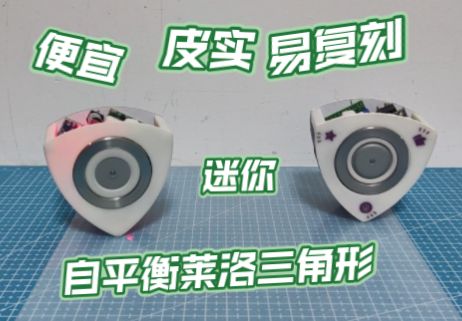 Completed
CompletedMini self balancing Lelo triangle
PRO Mini self balancing Lelo triangle
Mini self balancing Lelo triangle
License
:Public Domain
Description
A low-cost, easy-to-replicate miniature version of the self-balancing Lylo triangle
1. Function introduction
1) Self-balancing by rocking left and right;
2) Self-balancing at all 3 top corners;

2. The production cost
This is the list of materials, the production cost of the whole set is about 75-120, of which the postage accounts for nearly 1/3, in general, the cost is still relatively low.

3. Structural characteristics
1. Mini
Say it's mini, then how big is it, this is what it looks like when you put it together with Thunder, it's probably that big, its size mainly depends on the size of the brushless motor.

2. Mechanical structure
Its structure is very simple, mainly composed of shell, brushless motor, extrusion ring, momentum ring, 1S lithium battery and PCB.
The assembly process is also very simple, first fix the brushless motor on the shell with two screws, then install the extrusion ring, install the momentum ring, fix the brushless motor, extrusion ring and momentum ring together with 3 screws, and then paste the double-sided tape, cut off the excess part, stick the 1S lithium battery on the shell, then connect the motor cable, use 3 screws to install the PCB on the shell, and finally turn on the power supply and adjust the position of the cable.

3. PCB design
The PCB design is very simple, all modules are integrated on one side of the PCB, and there are no vias in the whole PCB, which is mainly to add color silk screen printing on the PCB in the future and give it some magic skin. In order to reduce the difficulty of soldering, the whole PCB adopts a modular design, which is a MPU6050 module, a LGT8F328P single-chip microcomputer, a 5V boost module, and a 12V boost module.


4. Firmware development
The MCU uses LGT8F328P MCU to develop a single-chip microcomputer program, which is inexpensive and can replace the Arduino nano.
5. Data Connection
All the information of the project has been placed in the BiliBili workshop, priced at 3 cents, mainly to rub some traffic, and earn a spicy strip to eat by the way, haha, if you want to learn PID, you can try to reproduce one!
Designed by DIY攻城狮 (from OSHWHub)
Design Drawing
 The preview image was not generated, please save it again in the editor.
The preview image was not generated, please save it again in the editor. Empty
Empty


Comment